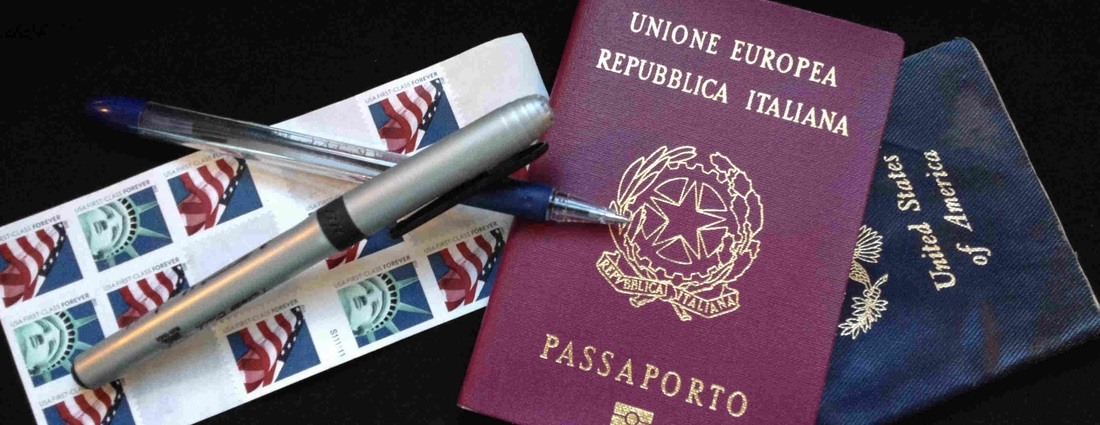|
When I first heard of the concept of Jus Sanguinis, I was intrigued by the concept of having dual citizenship. I wondered why someone--especially an American--would want this. Were there any downsides? Benefits?
So I looked into it a bit. There are definitely benefits to having an Italian passport:
According to Italian law, a qualified person can claim their Italian citizenship through Jus Sanguinis, the Right of Blood. The basic principle is that Italian citizenship is passed from father (or mother, only since 1948) to their children, even if those descendants gained citizenship in another country (such as in the U.S.) simply by being born there. The key is that the ascendant born in Italy and who immigrated to the US must have been an Italian citizen (i.e. not been naturalized as a US citizen) when his or her child was born. Italian women did not win the right to pass on citizenship to their children until 1948. Therefore, people born prior to Jan. 1st, 1948, can only claim citizenship from their paternal line, while those born on or after Jan. 1st, 1948, can claim from either their maternal or paternal line. There are many circumstances under which a descendant of an Italian citizen can qualify, but it might be difficult to provide the dates and many documents to satisfy the Italian regulations. Many people who have attempted to get their Italian citizenship have reported the process can easily take a couple of years and well over $1000 in fees to research and gain copies of documents, and in hiring a representative in Italy to act on your behalf in obtaining all the required Italian documents. The Legal Principals Jus sanguinis is Latin for "the Right of Blood", a legal principle of nationality law in which citizenship is not determined by place of birth, but by having one or both parents who are (or once were) citizens of the state. Children at birth may automatically be citizens if their parents have (or had previously) state citizenship or national identities of ethnic, cultural or other origins. The nationality law of Italy bestows citizenship jure sanguinis. There is no limit of generations for the citizenship via blood. However, the first citizens of the modern Italian state were alive on 17 March 1861 when the state was officially formed, and for this reason all claims of Italian citizenship by jure sanguinis must stem from an ancestor who was living after March 16, 1861. Each descendant of the ancestor through whom citizenship is claimed jure sanguinis could pass Italian citizenship to the next generation only if this descendant was entitled to Italian citizenship at the time of the birth of the next person in the line. So if any person in the line lost the Italian citizenship and then had a child, that child did not inherit Italian citizen jure sanguinis, except if the child could inherit the citizenship from the other parent. Cases of dual citizenship were possible, which is to say, for example, that a person in the line could have had Italian and Canadian citizenship concurrently. Minor children of Italian citizens were at risk of losing Italian citizenship if the child's parent naturalized in another country, unless the child was subject to an exception to this risk—and children born and residing in a country where they held dual citizenship by jus soli were subject to such an exception since 1 July 1912. Until 1 January 1948, Italian law did not generally permit women to pass on citizenship. Persons born before that date are in most cases not Italian citizens jure sanguinis if their line of descent from an Italian citizen depends on a female at some point before 1948. On several occasions, this limitation of deriving Italian citizenship only from fathers before 1948 has been successfully challenged in court. For more information: MyItalianCitizenship.com Read this case history of how one person succeeded in getting their Italian citizenship. --Jerry Finzi You can also follow Grand Voyage Italy on: Google+ StumbleUpon Tumblr
8 Comments
Jedidiah Smith
8/1/2018 04:09:43 pm
I'm trying to get dual citizenship but I'm not sure if I qualify.
Reply
Jerry F
8/3/2018 07:55:14 pm
Hi... whether you qualify depends on several variables... but it sounds like you can try through your great-great grandfather's line. Here's a link to help you find out if you qualify: http://www.dualcitizenshipitalian.com/step-by-step-guide
Reply
Gary
2/11/2019 03:03:51 pm
What if your parent is an international adoptee? Born in Italy but lived in the United States their whole life.
Reply
Jerry Finzi
2/17/2019 10:59:39 pm
It still might be possible to prove Jus Sanguinis. You can definitely get a hold of a birth certificate from where you were born. Usually they detail how the child was brought to the local mayor, who presented it, etc. Perhaps a DNA test might help. You should ask this question on one of the Italian genealogy pages on Facebook. There are experts who will guide you.
Reply
Thomas Gammon
5/19/2019 09:24:38 am
Hi my great grandfather and grand mother left Italy for the uk in the late teens early 1920s he returned to Italy for health reasons where he passed away latter would i be able to return to my home land ?
Reply
Sydnee Alyster
5/19/2019 10:35:47 am
My son's maternal grandmother was Italian horn before 1948. Her parents were immigrants. His grandfather was Hungarian.Could my son acquire Italian citizenship under those circumstances?
Reply
Julie Bakerville
5/20/2019 02:01:58 pm
Hello & thank you!
Reply
Michelle
8/22/2020 01:06:46 am
My father is first generation Italian. 100% on both sides. His parents and grandparents were both born in Italy. We also
Reply
Your comment will be posted after it is approved.
Leave a Reply. |
Categories
All
Archive
June 2024
|



 RSS Feed
RSS Feed
